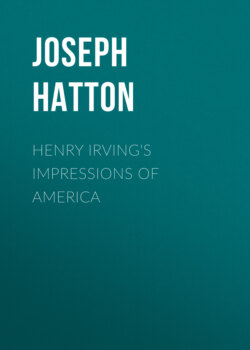Читать книгу Henry Irving's Impressions of America - Joseph Hatton - Страница 13
На сайте Литреса книга снята с продажи.
I.
ОглавлениеTable of Contents
Four o’clock in the morning, October 21, 1883. A cheerful gleam of light falls upon a group of Lotos guests as they separate at the hospitable door-way of that famous New York club. Otherwise Fifth avenue is solitary and cold. The voices of the clubmen strike the ear pleasantly. “Going to meet Irving,” you hear some of them say, and “Good-night,” the others. Presently the group breaks up, and moves off in different directions. “I ordered a carriage at the Brevoort House,” says one of the men who pursue their way down Fifth avenue. They are the only persons stirring in the street. The electric arcs give them accompanying shadows as black as the night-clouds above them. The Edison lamps exhibit the tall buildings, sharp and clear, against the darkness. Two guardians of a carpet-store, on the corner of Fourteenth street, sleep calmly among the show-bales that decorate the sidewalk. An empty car goes jingling along into Union square. A pair of flickering lights are seen in the distance. They belong to “the carriage at the Brevoort House.” It will only hold half our number. The civilities that belong to such a situation being duly exchanged, there are some who prefer to walk; and an advance is made on foot and on wheels towards the North river.
For my own part I would, as a rule, rather walk than ride in a private carriage in New York. The street cars and the elevated railroad are comfortable enough; but a corduroy road in a forest track is not more emphatic in its demands upon the nerves of a timid driver than are the pitfalls of a down-town street in the Empire city. I nevertheless elect to ride. We are four; we might be any number, to one who should attempt to count us, so numerous does the jolting of our otherwise comfortable brougham appear to make us. We are tossed and pitched about as persistently as we might be in a dingy during a gale off some stormy headland. Presently the fresh breeze of the river blows upon us as if to justify the simile; then we are thrown at each other more violently than ever; a flash of gas-light greets us; the next moment it is dark again, and we stop with alarming suddenness. “Twenty-second street pier,” says our driver, opening the door. We are received by a mysterious officer, who addresses us from beneath a world of comforters and overcoats. “Want the ‘Blackbird’?” he asks. We do. “This way,” he says. We follow him, to be ushered straightway into the presence of those active scouts and skirmishers of the American press—the interviewers. Here they are, a veritable army of them, on board Mr. Starin’s well-known river steamer, the “Blackbird,” their wits and their pencils duly sharpened for their prey. Youth and age both dedicate themselves to this lively branch of American journalism. I tell a London friend who is here to “mind his eye,” or they may practise upon him, and that if he refuses to satisfy their inquiries they may sacrifice him to their spleen; for some of them are shivering with cold, and complaining that they have had no rest. Finding an English artist here from the “Illustrated London News,” I conduct him secretly to the “Ladies’ cabin.” It is occupied by a number of mysterious forms, lying about in every conceivable posture; some on the floor, some on the sofas; their faces partially disguised under slouch hats, their figures enveloped in cloaks and coats. They are asleep. The cabin is dimly lighted, and there is an odor of tobacco in the oily atmosphere. “Who are they?” asks my friend, in a whisper. “Interviewers!” I reply, as we slip back to the stove in the saloon. “What a picture Doré would have made of the ladies’ cabin!” says the English artist.
